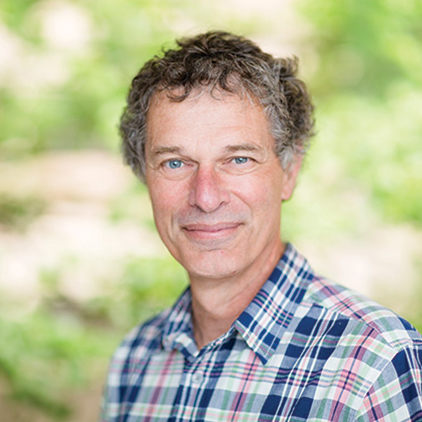
Director's Report
Early in February last year I was sitting down to dinner at the Australia and New Zealand Industrial and Applied Maths (ANZIAM) Conference along with some colleagues who work in epidemiological modelling. It was only a matter of two or three weeks after a new virus had been noticed in China, but my colleagues were unanimous and, unfortunately, confident that this virus would have an impact unlike anything that any of us had experienced in our lifetimes. Even though I knew something about historical epidemics, this shocked me at the time. Subsequently, I relayed this to a few non-mathematical friends and it shocked them even more.

Professor Peter Taylor, Director
Over the last year, I’ve reflected a great deal on the role of the mathematical sciences in the world’s response to the epidemic. It’s obviously true that the profile of at least some areas of mathematics and statistics has never been higher, with concepts such as `the R number’, `flattening the curve’ and `vaccine efficacy’ being bandied around in the media on a daily basis. As mathematical scientists, we would point to this as evidence of the centrality of our discipline to the welfare of society. But an important aspect that I want to emphasize is that the expertise of my above-mentioned colleagues did not arise in a vacuum. In fact, as you can hear in my Random Sample Podcast interview with James McCaw, the government started investing in epidemiological modelling as far back as 2004, and the expertise that Australia’s modellers brought to bear on COVID-19 was the product of many years of work.
Thus, a long-term investment in capacity building, involving training people to engage in research and develop worldwide networks at the highest level, has paid off in manyfold terms for Australian society. An obvious point to make is that ACEMS is similarly a long-term investment in Australia’s mathematical science capacity at the highest level. As we describe elsewhere in this report, ACEMS researchers have been part of the COVID-19 modelling effort, but the scope of ACEMS research is much broader. I’m very confident that the long-term investment in the rest of our activities will similarly pay off down the track, albeit with a public profile that may not be as high.
COVID-19 has, of course, had many other consequences. Its emergence and the measures that governments have taken to contain it have directly affected many of the things that a Centre of Excellence like ACEMS is supposed to do. Many ACEMS members were locked down in small apartments, had to change their living arrangements or faced uncertainty over the welfare of their loved ones. During 2020 and beyond, international, cross-node and industry collaboration were very much more difficult because we could not engage face-to-face. Mentoring, networking and generally supporting each other were harder because they mostly had to occur over Zoom or the phone. On the research front, I personally found it very challenging to discuss deep mathematical concepts with my students and colleagues without standing next to them around a whiteboard or sitting with a piece of paper in front of us. And we all had to deal with increased workloads caused by financial problems in our institutions, the need to move teaching on-line and increased `management workload’.
During 2020, all these things presented challenges for the morale and even the mental health of ACEMS members. This was recognised by those of us in leadership positions and we did our best to support the people around us. A standing item at Chief Investigators meetings was the welfare of our respective groups, and I was very pleased with the proactive manner that the Chief Investigators engaged with these issues. An initiative in this direction was the voluntary survey conducted by Postdoctoral Fellow KD Dang. With her mentor Louise Ryan, KD designed the survey to find out about the specific challenges that COVID-19 had posed for ACEMS members, with the intention that ACEMS would provide support if it could.
As it comes to the end of its funding, ACEMS is acutely aware that its graduating students, early career researchers and professional staff are having to move to the next phase of their career in a very difficult environment, where businesses and universities are downsizing and cutting positions. On the other hand, ACEMS saved some of its projected 2020 expenditure because travel and face-to-face conferences did not occur. To the extent that it can, ACEMS intends to use these savings to smooth the transitions of its members to their next positions via funding appropriate training, research assistance or bridging positions.
A highlight of ACEMS’ 2020 activities was November’s Retreat which, as usual, was split into Early-Career Researcher (ECR), Student and Main Retreats, all held in a virtual format. The plenary speaker at the ECR and Student Retreats was New South Wales Chief Scientist Hugh Durrant-Whyte. Many of those who completed the subsequent survey reported that they were inspired by the story of Hugh’s career. The emphasis that he placed on addressing the `big questions’ impressed everyone. The industry keynote talk at the beginning of the Main Retreat was presented by Sybille McKeown from Partner Organisation the Australian Bureau of Statistics. It was very interesting to hear about Sybille’s take on the subject `What is at the core of an ACEMS legacy’. The third plenary talk was presented by Stanford University-based Scientific Advisory Committee member Iain Johnstone on the subject `Expectation Propagation in Mixed Models: A Legacy of Peter Hall’. Iain’s plenary was the best such talk that we have ever had at a retreat. It was fantastic to see how he and his colleagues, including ACEMS CI Matt Wand, have built on the work of our inaugural Director Peter Hall.
I’d like to thank ACEMS Finance Manager Minh Nguyen, and the Chairs of the ECR and Student Committees Rachael Quill and Aishwarya Bhaskaran respectively for the leadership that they showed in taking on the responsibility for pulling together the Main, ECR and Student Virtual Retreats. It is no small thing to put your hand up and take responsibility for delivery of a well-run event and I very much appreciate the fact that Minh, Rachael and Aishwarya were prepared to do it.
ACEMS managed to keep up its energy in other activities. A COVID-19 Research Workshop was held in early June, at which researchers reported their contributions to the fight against the pandemic. The variety of approaches nicely reflected the breadth of expertise that ACEMS researchers bring to the table. ACEMS Outreach Officer Rosanna Verde was the driving force behind nine Virtual Public Lectures and the National Science Week Virtual Quiz. Media and Communications Officer Tim Macuga produced twenty-one episodes of the Podcast Series, The Random Sample, as well as helping many ACEMS researchers gain recognition for their other activities. Remarkably, ACEMS also managed to sustain an active engagement with its Partner Organisations and Industry Affiliates, as well as developing new relationships. In this area, I want to acknowledge the massive energy that Stakeholder Engagement Officer Angela Dahlke brought to her position. ACEMS second Outreach Officer Anita Ponsaing, whose main responsibility is the MathsCraft program, took maternity leave during 2020. The in-person activities of MathsCraft were severely hampered by COVID-19 because it wasn’t possible to get high-school teachers and students in the same room for MathsCraft sessions. However, this doesn’t mean that there was no progress. Indeed, as is reported elsewhere, the MathsCraft team has been trialling new teaching materials designed to embed the MathsCraft philosophy into the mathematics curriculum.
As is becoming usual, members of the ACEMS community were acknowledged right up to the highest level for their contributions – see Achievements. Highlights were Governance Advisory Board member and Associate Investigator Tony Guttmann being named a member of the Order of Australia (AM) for significant service to the mathematical sciences and education, CI Aurore Delaigle being elected to a Fellowship of the Australian Academy of Science, CI Rob Hyndman and AI Gael Martin being elected Fellowships of the Australian Academy of Social Sciences, AI Mat Simpson receiving the E.O. Tuck Medal for outstanding research and contributions to the ANZIAM community by a mid-career researcher, AI Nicole White being selected by Science and Technology Australia as one of its Superstars of STEM, AI Susannah Cramb receiving a Queensland Young Tall Poppy Science Award and Masters student Rose Crocker winning the T.M. Cherry Prize for best student presentation at the ANZIAM conference.
I started my 2019 Director’s Report by talking about ACEMS contribution to Equity and Diversity in the mathematical sciences. Providing a template that demonstrates that our discipline can function in a way that allows everyone to participate is at the very core of what ACEMS is about. There were extra challenges in 2020, not least the fact that the burden of COVID-19 lockdowns tended to fall unequally on our female members, see for example the open letter from the European Women in Mathematics . To enable the ACEMS community to debate these issues, Rachael Quill chaired a panel discussion at the ACEMS Retreat on Career impacts of COVID-19 on researchers with Adrian Barnett, Jessica Purcell and Gunilla Burrowes. I hope that the discussion can continue and that ACEMS can contribute to advocating for the measures outlined in the letter and proactively addressing the issues.
I am heartened by the fact that so many ACEMS members have recently taken maternity leave. I think that we have demonstrated that a research organisation can still function well even when very capable members are on extended leave and, furthermore, that the long-term health of an organisation is enhanced if it does the best it can to help its employees balance their professional and family lives. It is noteworthy that the very good performance of some of our maternity leave replacements has been a major factor in their subsequent career progression – a definite win-win situation.
In the COVID-19 environment, it has become apparent that it is not only necessary to allow some flexibility in the operation of ACEMS, but also that it’s entirely possible to function flexibly in an ongoing sense. One area that has required flexibility is the Centre’s equity and diversity initiatives, the Carer’s Provision Fund, the International Women in Maths Day events and the relevant provisions of our sponsorship rules. I think that we managed to do this without compromising the principles of the initiatives. One unfortunate downside of COVID-19 was that the recipient of one of the three female-only postdoctoral fellowships was unable to take up the position because she was prevented from travelling to Australia.
I’d like to acknowledge the contributions of all ACEMS members during a very difficult year. In particular, I’d like to thank our professional staff Rosanna, Tim, Angela and Anita Ponsaing mentioned above, as well as our Central Administration Officer Ben Hess who has an astounding knowledge of anything to do with our website and reporting system, as well as providing secretariat assistance to the Executive and Equity and Diversity Committees, Claudia Deasy and Tracy Kelly, who ran our mentoring and other support programs, and our node administrative support officers.
Finally, I’d like to mention our two Chief Operating Officers, Emily Duane for the first half of 2020 and her maternity leave replacement Anita Vecchies who was seconded from the University of Melbourne Research Office as her replacement for the second half. Emily and Anita brought slightly different skills and temperaments to the position. But I’ve appreciated enormously the opportunity to work with both of them. Their outstanding contributions were crucial to the smooth running of ACEMS in 2020.

Professor Peter Taylor
Director
April 2021